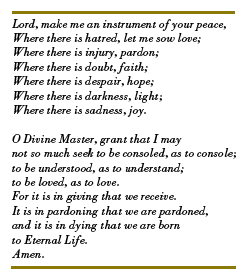![]() Devotion index
Devotion index
![]()
Spiritual practices
![]()
Book reviews
![]() Background
Background
John 21:17
The third time he said to him, "Simon son of John, do you love me?"
Peter was hurt because Jesus asked him the third time, "Do you love me?" He said, "Lord, you know all things; you know that I love you."
Jesus said, "Feed my sheep."
June 22, 2013
What repentance looks like
In late June 2013 the news broke that Alan Chambers, founder of Exodus International, had apologized for the ministry and was shutting it down. Exodus was the prototype evangelical “ex-gay” ministry that purported to change homosexuals into heterosexuals through prayer and various counseling and behavioral techniques. Over the years, many LGBT people were greatly harmed when either they voluntarily sought out or (more often) their well-meaning religious family members took them to Exodus practitioners to be “cured.”
Exodus was based on a number of evangelical/fundamentalist tenets: • The strict, literal infallibility of the Bible, read without an acknowledgement of context, nuance, or the culture or times in which people lived. • Within this view of the Bible, the passages in scripture that have been interpreted to describe homosexual tendencies and acts as sins that are based on people choosing to be aberrant. • Therefore, homosexuals make conscious choices to sin by being attracted to others of their sex. • Because this is a sin issue, prayer, aversion techniques, hating the sin, repenting and then willing oneself to making different choices will remove the attraction and “cure” the person into heterosexuality.
Chambers claimed for a long time that he himself had been cured of his same-sex attraction, by employing the techniques Exodus came to employ. Here is Chambers’ apology in full.
Chambers’ public apology, by contrast, is direct and contrite. He spells out the ways Exodus hurt people over the years. He acknowledges his part in it. He talks about how in trying to do good, he did great harm. He admits he himself was not “cured,” even though he claimed he had been. And he is ceasing what he is doing, ending the behavior, and shutting down the ministry.
Of course, predictably already others in this camp are circling the wagons and promoting their own versions of Exodus. It will be interesting to see what the LGBT community does with this repentance. Will there be piles of lawsuits? (Likely.) Will there be cries of “This did not go far enough!”? (Already happening.) Will there be a thoughtful, forgiving, healing response? (Hopefully.)
I’m watching and praying for something else to happen, though. I believe it will be more than interesting to see what God does with this kind of repentance. What will God do with Alan Chambers? With the relationships between those harmed by Exodus and their families? The church and the LGBT community? Exodus practitioners? The evangelicals and fundamentalists? There are so many possibilities here. But each possibility rests on the decisions of people to honestly repent, and people to honestly forgive. And therein lies the rub. Both of these things are incredibly difficult for us.
 People—Christians—by and large, do not want to do the very thing Jesus said was most important. We do not want to repent.
People—Christians—by and large, do not want to do the very thing Jesus said was most important. We do not want to repent.
It is as though even though we know the famous prayer of St. Francis, we deliberately have done the exact opposite. That is how we run our lives and that is how we run our churches.
How foolish we are! How much needless hurt we have caused each other? How many churches have died, how many people have not come to Christ? How many have walked away from the faith, how much good is not being done in the world in Christ’s name? All because we are a stiff-necked people and will not take an honest look at ourselves and repent.
We are all of us sinners, ordained and lay alike. And what is worse, we who are supposedly the redeemed prefer to wallow in our self-perceptions and continue to hurt each other rather than do the most basic thing Christ asks of us: die to ourselves, acknowledge our sin and repent.
Let us do as Alan Chambers has done. Let us be willing to let God examine us. Let us allow our consciences be pricked and our souls uneasy.
Lord, lead us to repentance. Lord, forgive us. Lord, change us.
.
Repent, for the kingdom of heaven has come near.
—Matthew 3:2